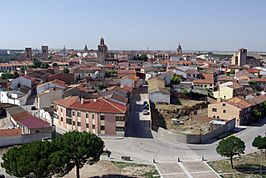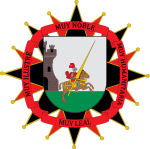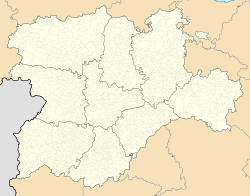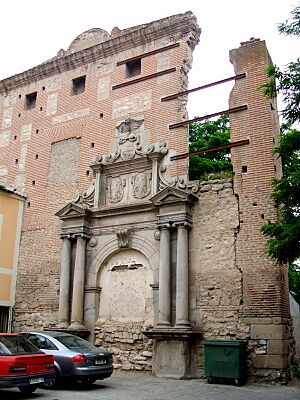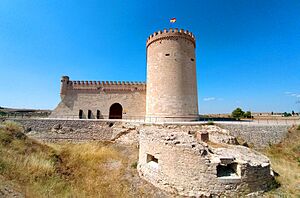Arévalo facts for kids
Quick facts for kids
Arévalo
|
|||
|---|---|---|---|
|
municipality
|
|||
|
1) Castle of Arévalo; 2) Church of San Martín; 3) Partial view of Arévalo; 4) View of the main square.
|
|||
|
|||
| Country | |||
| Autonomous community | |||
| Province | |||
| Area | |||
| • Total | 46.07 km2 (17.79 sq mi) | ||
| Elevation | 820 m (2,690 ft) | ||
| Population
(2018)
|
|||
| • Total | 8,069 | ||
| • Density | 175.147/km2 (453.63/sq mi) | ||
Arévalo is a town in Spain. It is located in the province of Ávila and is part of the Castile and León region. The name Arévalo comes from an old Celtic word, arevalon. This word means "place near the wall."
Contents
Why Arévalo is Special
Arévalo is the main town of an area called La Moraña. A very important person, Queen Isabella I of Castile, grew up here. The Spanish government has named Arévalo a Historic-Artistic site. This means it is a very important place for art and history. It has many examples of Mudéjar art, which is a special style of art and architecture. It mixes Christian and Islamic designs.
Arévalo's Location and People
Arévalo is located 820 meters (about 2,690 feet) above sea level. It is close to where two rivers, the Adaja and Arevalillo, meet. The town covers an area of 46.07 square kilometers (about 17.79 square miles). In medieval times, Arévalo was an important center for farming in its region.
Historic Buildings and Places
Arévalo is full of amazing old buildings and places to see.
Ancient Walls
The city walls, called La Muralla, are very old. You can still see the northern part of them. The eastern part is mostly gone, but it is being fixed. The walls used to form a triangle shape. The Castle of Arévalo was at the top point. The Arevalillo and Adaja rivers protected two sides of the triangle. The third side had a double wall and a ditch for protection.
Important Churches
- The parish church of Santo Domingo de Silos is a beautiful old church.
- The church of San Juan is another historic church in the town.
- The church of Santa María has a unique tower. A street actually goes right through it!
- The church of San Miguel holds a large collection of valuable artworks.
- The church of San Martín is also known as the Torres Gemelas, or Twin Towers. It used to be a mosque and still has a very special style.
- The church of El Salvador (The Savior) is where the special floats for the Easter parades are kept.
Other Historic Buildings
Besides the churches, Arévalo has many other old brick buildings from different times. These include:
- The palace of the Gutiérrez de Altamirano
- The house of the militia
- The palace of Cárdenas
- The palace of río Ungria
- The palace of Real
- The palace of Ballesteros Ronquillo
- The palace of Sedeño
- The palace of general Vicente del Río
There are also several old convents. The castle now has a Museum of Cereal inside. You can also visit several plazas, like Plaza del Arrabal, Plaza Del Real, Plaza de San Pedro, and Plaza de la Villa.
Getting Around Arévalo
The A-6 highway connects Madrid to La Coruña. Many people use this highway to travel to bigger cities in the northwest of Spain.
Arévalo also has a train station on the Madrid-Hendaya line. This train line connects the town to many cities. You can travel to Madrid, Ávila, Medina del Campo, Valladolid, Burgos, Palencia, Vitoria, and Santander by train.
What Arévalo Does for Work
The main jobs in Arévalo are in farming and raising animals. There is also a lumber industry. A small but strong industrial area focuses on processing farm products. These are the main ways people earn a living in Arévalo.
Learning in Arévalo
Arévalo has several schools for children and teenagers.
- There are three primary schools: C.P. La Moraña, C.P. Los Arevacos, and el Amor de Dios.
- For secondary education (high school), there are three centers: Los Salesianos, I.E.S Adaja, and I.E.S Eulogio Florentino Sanz.
Fun Places to Visit
Arévalo has many interesting places to explore:
- The impressive Avenida Emilio Romero.
- A sports facility for games and activities.
- A new bridge that was recently built.
- The main square, called Plaza de la Villa.
- The municipal library, where you can find books.
- The Museum of Cereal, located inside the castle.
- The Arévalo History Museum, where you can learn about the town's past.
- A nature center in Plaza del Real.
- A Tuesday market at the fairground, where you can find local goods.
Town Traditions and Festivals
Festivals
Arévalo celebrates its main festival for its patron saint, San Victorino, on July 7th. During this festival, there is a traditional parade with big-headed figures called cabezudos. The fairground opens, and there are bullfights in the town's streets. The festivals end with fireworks from the castle around 11 PM.
Sister City
See also
 In Spanish: Arévalo para niños
In Spanish: Arévalo para niños
 | Sharif Bey |
 | Hale Woodruff |
 | Richmond Barthé |
 | Purvis Young |




